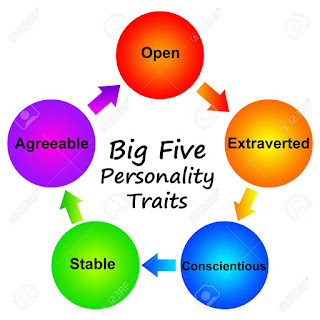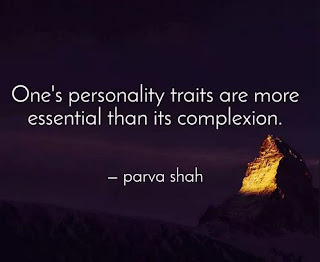YOUR PERSONALITY TRAITS AND YOU.
Definition of Terms;
For easy understanding of terms
involves in this post I will define each terms that we will be discussing about
in this post.
Personality:
Is easy read, it is an individual’s
behaviour toward others, attitude, characteristics, mindset make his
personality.
Personality development:
Is defined as a process of enhancing one’s personality. Personality development sessions guide an individual as to how he/she can develop his/her personality.
Traits:
A trait is something about you that
makes you “YOU”. For example, When your mother says that you get all your best
traits from her as a lady, she means you have the same charming smile and the
brilliant mind as she has. In science, trait refers to a characteristic that is
caused by genetics.
Personality Trait:
This reflects people’s
characteristic patterns of thoughts, feelings, and behaviours. Personality
traits imply consistency and stability.
What make us who we are? Each
person has a idea of their own personality type- if they are bubby or reserved,
sensitive or thick-skinned. Psychologists who try to tease out the science of
who we are defines personality as individual differences in the way people tend
to think, feel and behave.
There are many way to measure personality,
but psychologists have mostly given up on trying to divide humanity neatly into
types. Instead, they focus on personality traits.
The most widely accepted of these
traits are what is called and known as the “BIG FIVE” which are as follows;
- Openness to Experience
- Conscientiousness
- Extraversion
- Agreeableness
- Neuroticism
Psychologist also derived a
mnemonic to help in remembering these five traits in hand, and it known as “OCEAN”.
The Big Five were developed in the
1970's by two research teams. These teams were led by Paul Costa and Robert
R Mccrae of the National Institutes of Health and Warren Norman and
Lewis Galdberg of the University of Michigan at Ann Arbor and the University or
Oregon according to Scientific American.
The Big Five are the ingredients
that make up each individual’s personality. A person might have a dash of
Openness, a lot of Conscientiousness, an average amount of Extraversion, plenty
of Agreeableness and almost no Neuroticism at all. Or someone could be
disagreeable, neurotic, introverted, conscientious and hardly Open at all.
In other to understand and know more about the BIG Five Personality traits get this book from Amazon.
Here is what each Personality Trait
entail in detail:-
Openness To Experience:
Openness is a general appreciation
for art, emotions, adventure, unusual ideas, imagination, curiosity, and
variety of experience. People who are open to experience are intellectually
curious, open to emotions, sensitive to beauty and willing to ty new things.
They tend to be, when compared to
closed people, more creative and more aware of their feeling. They are also
more likely to hold unconditional beliefe.
People low in Opennessare just
the opposite. They prefer to stick to their habits, avoid new experiences and
probably aren’t the most adventurous eaters. Moreover, individuals with high
openness are said to pursue self-actualization
specifically by seeking out intense, euphoric experiences. Conversely, those with low Openness seek to gain fulfillment
through perseverance and are characterized as pragmatic and data-driven-
sometimes even perceived to be dogmatic and closed-minded.
CONSCIENTIOUSNESS:
Conscientiousness is a tendency to
display self-discipline
act dutifully, and strive for achievement against measures or outside
expectations. It is related to the way in which people control, regulates and
direct their impulses. People with these traits never perform any task in haste
but think twice before acting. They are generally methodical and tend to become
perfectionist in the long run.
People who score high on
conscientiousness are proactive, goal-oriented and self-discipline. They strive
hard to accomplish goals and objectives within the stipulated time frame. High
Conscientiousness is often perceived as being stubborn and focused. Low
Conscientiousness is associated with flexibility and spontaneity, but can
appear sloppiness and lack of reliability. High scores on Conscientiousness indicate
a preference for planned rather than spontaneous behaviour.
EXTRAVERSION:
Extraversion is characterized by
breath of activities (as opposed depth), surgency from
external activity/situations, and energy creation from external means. The
trait is marked by pronounced engagement with the external world.
Extroverts enjoy interacting with people, and are often perceived as full
of energy. They tend to be enthusiastic, action-oriented individuals. They
possess high group visibility like to talk, and assert themselves.
Extroverted people may appear more
dominant in social setting, as opposed to introverted people in this setting.
Introverts have lower social
engagement and energy levels than extroverts. They tend to seem quiet, low-key,
deliberate, and less involved in social world. Their lack of social involvement
shouldn’t be interpreted as shyness or depression; instead they are more
independent of their social world than extroverts. Introverts need less
stimulation and more time alone than extroverts. This doesn’t mean that they
are unfriendly or anti-social; rather they are reserved in social situations.
AGREEABLENESS:
The agreeableness trait reflects
individual differences in general concern for social harmony. Agreeable
individuals values getting along with others. They are generally considerate,
kind, generous, trusting and trustworthy, helpful, and willing to compromise
their interest with others. Agreeable people also have an optimistic view of
human nature.
Disagreeable individuals place
self-interest above getting along with others, they are generally unconcerned
with others’ well-being, and are less likely to extend themselves for other
people.
Sometimes they are skeptical about
others’ motives causes them to be suspicious, unfriendly and uncooperative. Low
agreeable personalities are often competitive or challenging people, which can
be seen as argumentative or untrustworthy.
Since Agreeableness is a social
traits, research has shown that one’s agreeableness positively correlates with
the quality of relationship with one’s team members. Agreeableness also
positively predicts transformational
leadership skills. Conversely agreeableness has been found to be
negatively related to transactional
leadership in the military. A study of Asian military unit showed
leaders with a high level of agreeableness to be more likely to receive a low
rating for transformational leadership skills.
NEUROTICISM:
Neuroticism is the tendency to experience negative emotions, such as;
anger, anxiety, or depression. It is sometimes called Emotional Instability or is reversed and referred to as Emotional
Stability. According to Eysenck’s (1967) theory of personality,
Neuroticism is interlinked with low tolerance for stress or aversive stimuli.
Neuroticism is a classic temperament trait that has been studied in Temperament Research for
decades, before it was adapted by the FFM.
Those who score high in Neuroticism
are emotionally reactive and vulnerable to stress also tending to be flippant in the way the express
emotion. They are more likely to interpret ordinary situations as threatening,
and minor frustrations as hopeless difficulty.
Their negative emotional reactions
tend to persist for unusually long periods of time, which means they are often
in bad mood. For instance, neuroticism is connected to a pessimistic
approach toward work confidence that work impedes personal
relationships and apparent anxiety linked with work. Furthermore, those who
score high on Neuroticism may display more skin-conductance reactivity than
those who score low on Neuroticism. These problems in emotional regulation can
dimish the ability of a person scoring high on Neuroticism to think clearly,
make decisions, and cope effectively with stress.
Lacking contentment in one’s life
achievements can correlate with high Neuroticism scores and increase one’s
likelihood of falling into Clinical
Depression. Moreover, individual’s high in Neuroticism also tend to
experience more negative life events, but Neuroticism also changes in response
to positive and negative life experiences. Also, individuals with levels of
Neuroticism tend to have worse psychological well-being.
At the other end of the scale,
individuals who score low in Neuroticism are less easily upset and are less
emotionally reactive. They tend to be calm, emotionally stable, and free from
persistent negative feelings. Freedom from Negative feeling doesn’t mean that
low-scorers experience a lot of positive feeling either.
Click here to read about How to
discover your Hidden Potential.
To know how to discover your hidden potential in life.
click here to read about it.
To know about all the positive personality trait we exhibit as Human click here
Note this quotes below:
To know about all the positive personality trait we exhibit as Human click here
Note this quotes below:
You might also like:
- Nigeria Police Academy 2020/2021 - Application Form & Portal
- CRUTECH 2020/2021 Admission Requirement - Application Form & Portal
- WAEC GCE 2nd Series 2020 Registration commence
- Nigerian Defence Academy Courses and Requirement 2020/2021 - Application Form & Portal
- Nigerian Defence Academy (NDA) 2020/2021 - Application Form & Portal











0 Comments
Your feedback is welcome